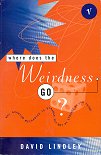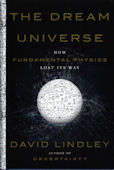Where Does the Weirdness Go? is a fascinating, informative and highly readable explanation of one of the most dramatic and far-reaching revolutions in modern science.
This is a great account of that most weird of all subjects: quantum mechanics. Lindley eschews the increasingly popular approach of arranging his material historically and biographically. Rather, he orders his material in a way more appropriate to explaining the subject matter, focussing on describing the essential physics in a logical manner, and leaving the people involved where they belong: on the periphery. This focus in no way makes the book dry or inaccessible. Lindley has a light touch, describing his material clearly and amusingly. His prose style is delightfully transparent throughout. However, there is one place where he uses a deliberately obscure style to make his point; I laughed out loud when I got to the end of
The majority of the book is taken up with a careful description of quantum measurements, and what the implications are. Entanglement emerges “for free” from this treatment – it’s just the way the quantum universe is. Then towards the end we get an equally careful description of decoherence: why the macroscopic world doesn’t exhibit quantum weirdness (except in very carefully arranged circumstances), and why Schrodinger’s cat isn’t a problem.
Lindley clearly describes the science and the philosophy: what it does, and what it means. A must read for anyone who wants to understand the implications of living in a quantum world.

